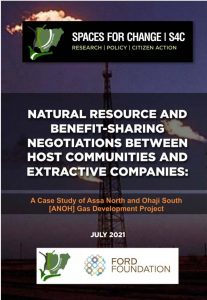At a virtual ceremony held on July 12, 2021, SPACES FOR CHANGE | S4C launched its latest research report, titled “Natural Resource and Benefit – Sharing Negotiations between Host Communities and Extractive Companies: A Case Study of Assa North and Ohaji South [ANOH] Gas Development Project”. The virtual launch drew the participation of forty-eight (48) stakeholders in the extractive industry in Nigeria, comprising government officials (federal, state, and local), ANOH project operators, representatives of oil majors, civil society organizations, policy think tanks, host communities and the media.
In a goodwill message delivered at the opening session, Emmanuel Kuyole of Ford Foundation, welcomed the research study as an expository documentation of the challenges faced by oil producing communities, especially regarding the social and economic benefits that accrue to them. By properly addressing these challenges, land rights and livelihoods of locals would be secure and therefore, douse tensions experienced in the region. This aligns with the Ford Foundation’s objective to ensure that natural resource governance serves public interest and reflects the aspirations of the rural low-income indigenous communities. He urged the government and other stakeholders to utilize the report and the recommendations to push for active participation of local communities in benefit-sharing negotiations according to due process of free, prior and informed consent.
Presenting the research findings, Victoria Ibezim-Ohaeri of SPACES FOR CHANGE walked the participants through the structure, methodology, key findings, and recommendations of the report. The $700 Million Assa North and Ohaji South (ANOH) Gas Development Project is one of the major infrastructure development initiatives designed to reverse Nigeria’s energy poverty and close the demand-supply gap in the domestic gas market while complementing the federal government’s objective to meet the target of generating at least 15 gigawatts (GW) of electricity by 2020. The research, supported by the Ford Foundation, offers an independent appraisal of the community engagement and benefit-sharing practices between host communities and extractive companies operating the ANOH Gas Development Project.
S4C used three indicators to gauge the effectiveness of community engagement practices in the ANOH project: the land acquisition and compensation arrangements, the extractive companies’ consultation and benefit sharing mechanisms and the operators’ level of compliance with environmental regulations. Like a double-edged sword, the report on one hand, flags and pushes the boundaries of good practice and on other hand, captures ongoing challenges particularly pertaining to the negotiation of costs and benefits between extractive companies and their host communities so that they can be better managed to prevent tension from rising to a level that would be too difficult to repair. The methods employed during the research, particularly the community outreaches, stakeholder engagements and the analytical rigor form part of a broader strategy to change the lopsided power dynamics between companies and communities to ensure that the negotiation of the costs and benefits follows a process that meets the criteria for community participation, consultation, and free, prior, and informed consent.
Among several findings, the report found that SPDC and Seplat recognize that stakeholder engagement and community development are crucial to the achievement of a stable climate for extractive activities. The concept of ‘participatory partnership’ reflect their acknowledgement of the mutual benefits arising from community participation, cultural preservation, environmental sustainability recognizing the needs of host communities as well as the maintenance of cordial relationships between host communities and extractive companies. In addition, the technical knowledge of oil and gas development, processing, transmission and especially the environmental impacts, is low within communities, meaning that local stakeholders may indeed attend meetings convened by extractive companies, without understanding what is being discussed. Limited access to information and absence of third-party supervision and legal representation shaped communities’ capacities during the negotiation of benefits encoded in the GMOUs. Huge capacity-building deficits among locals must be urgently reversed to increase their ability to negotiate better deals and fairer benefits from extractive projects, the report recommended.
Reacting to the report, the ANOH project promoter, Shell Petroleum Development Company Limited (SPDC), represented by its General Manager, External Relations, Igo Weli, welcomed the opportunity to participate in the event. In line with SPDC’s core values of honesty, integrity, and respect, their company is also working to ensure extractive resources yield maximum benefits for local communities, and the oil and gas industry in general. “SPDC is willing to engage and share its deep perspectives on the ANOH project with interested stakeholders”, he concluded.
Several participants took turns to ask questions and give feedback on a wide range of issues raised in the report such as the implementation of the Local Content laws, negotiation of Global Memorandums of Understanding (GMOU) between companies and communities, environmental impact assessment, oil pollution, the Petroleum Industry Bill, the nature of community benefits and the outcomes of community-company engagements.




